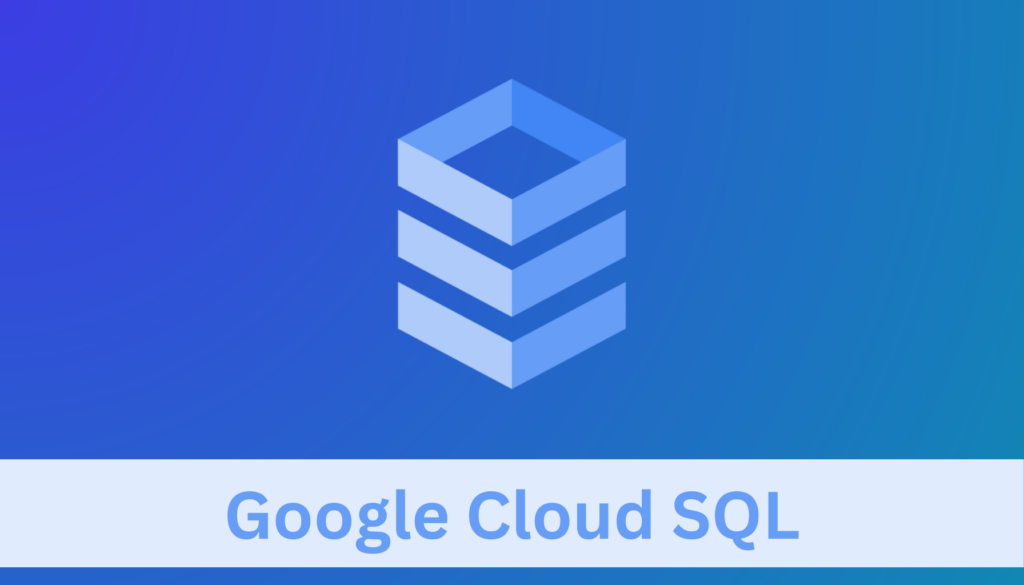What is Cloud SQL?
Google Cloud SQL is a fully managed database service that simplifies the setup, maintenance, management, and administration of relational databases on the cloud. It supports popular database engines like MySQL, PostgreSQL, and SQL Server, making it a versatile solution for a wide range of applications.
One of its primary benefits is its ability to offer high availability and scalability without the complexity typically associated with these operations. By leveraging Cloud SQL, businesses can significantly reduce the overhead of database management, enabling them to focus more on their core activities.
This service is particularly useful for those looking to migrate their existing databases to the cloud or develop new cloud-native applications with a robust, reliable, and secure database backend. Cloud SQL enhances both the efficiency and flexibility of database handling, making it a vital component in the toolkit of developers and businesses utilizing the cloud for their data needs.
What are the Key Features of Google Cloud SQL?
Cloud SQL comes packed with a variety of features that fulfill different needs, from high availability to integrated security. Let’s look at some of its core features:
1. High Availability and Durability
Cloud SQL ensures high availability and durability of your data. It automatically replicates data in multiple locations in real time to protect against unforeseen failures. Additionally, it offers failover capabilities, so your databases remain operational even in the event of an outage.
2. Scalability and Flexibility
This service provides seamless scalability options. You can adjust your database’s resources according to your needs, scaling up or down as your application’s requirements change. Cloud SQL also supports read replicas, which help in load balancing for read-heavy operations.
3. Integrated Security Features
Security is paramount in Cloud SQL. It offers built-in encryption for data at rest and in transit, along with a private network option for enhanced security. Regular updates and patches are managed by Google, ensuring your database is always protected against vulnerabilities.
4. Managed Database Services
Cloud SQL is a fully managed service, meaning Google handles the maintenance and administration tasks. This includes automated backups, patch management, and version updates, freeing up your time to focus on more critical business tasks.
5. Data Backup and Recovery
The service provides automated backups and point-in-time recovery features, enabling you to easily restore your databases to a specific time in case of data loss. This feature is crucial for maintaining data integrity and business continuity.
6. Monitoring and Analysis Tools
Finally, Cloud SQL integrates with Google’s Stackdriver for monitoring and logging. This provides detailed insights into database performance, helping you identify and resolve issues swiftly. You can set up custom alerts and analyze logs for a comprehensive understanding of your database’s health and performance.
Google Cloud SQL Pricing Overview
Understanding the pricing structure of Cloud SQL is crucial for efficient budgeting and cost management. Here’s an overview of how pricing works for this service:
Pricing Components
- Instance Type: Costs vary based on the type of instance you choose, such as shared-core instances or dedicated-core instances.
- Storage and Networking: Charges are applied for the storage capacity (both for database storage and backup storage) and network usage.
- Database Engine: Different pricing may apply depending on whether you use MySQL, PostgreSQL, or SQL Server.
- Additional Features: Features like high availability, read replicas, and custom machine types can affect the overall cost.
Pricing Models and Plans
Cloud SQL offers various pricing models:
- On-Demand Pricing: You pay for the resources you use, without any upfront costs. This model is best if you are starting with Cloud SQL and don’t know the right amount of resources you are going to need.
- Committed Use Discounts: This applies to users who commit to using Cloud SQL resources for a one- or three-year term. This is ideal for predictable workloads.
What is included in Cloud SQL Free Tier?
Google Cloud Platform (GCP) provides 20+ services for free for all customers. But they don’t have Cloud SQL listed there. There are some features that you get for free for a limited time or resource.
- Up to 7 days of free PITR Logs on Cloud SQL Enterprise and 35 days on Cloud SQL Enterprise Plus
- Free data ingression for instance in the same region
Aside from that GCP also provides $300 free credits for 90 days to try out their services before investing. That’s enough time for a business to make an informed decision.
How to Optimize Google Cloud SQL for Cost Savings?
Optimizing costs is a critical aspect of managing Cloud SQL services effectively. Here are several strategies to help you minimize expenses while maintaining performance:
1. Efficient Resource Utilization
Carefully assess your resource needs and choose the appropriate instance types and sizes. Avoid over-provisioning resources; instead, leverage Cloud SQL’s ability to scale to match your actual usage patterns.
2. Choosing the Right Plan
Analyze your usage patterns and consider if committed use discounts (CUD) could offer savings compared to on-demand pricing, especially for long-term, consistent usage.
3. Automated Backups and Data Retention
Configure automated backups efficiently and set an optimal data retention policy. This helps in reducing storage costs associated with backups that are no longer necessary.
4. Instance Sizing and Scaling
Regularly review your instance performance and adjust the size or scale up/down as needed. Utilizing custom machine types can also lead to cost savings by tailoring resources to your specific needs.
5. Monitoring and Alerting
Use GCP’s monitoring tools to track your Cloud SQL instances’ performance and costs. Setting up alerts for unusual activity or spikes in usage can help in quickly addressing issues that could lead to higher costs.
Conclusion
Cloud SQL is a robust, fully managed database service that offers high availability, scalability, and integrated security features. Its flexible pricing models are tailored to different usage patterns, allowing for cost-effective database management. To fully leverage the benefits of Cloud SQL and optimize costs, it’s advisable to consider your specific needs and consult with cloud professionals. This approach ensures an efficient, secure, and cost-effective database solution for your cloud computing requirements.
Ready to Optimize Your Google Cloud SQL Usage?
[Reach out for specialized guidance] to ensure your setup is both cost-effective and high-performing.

